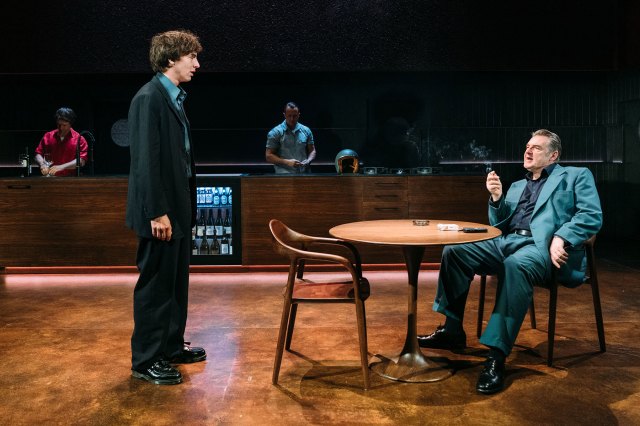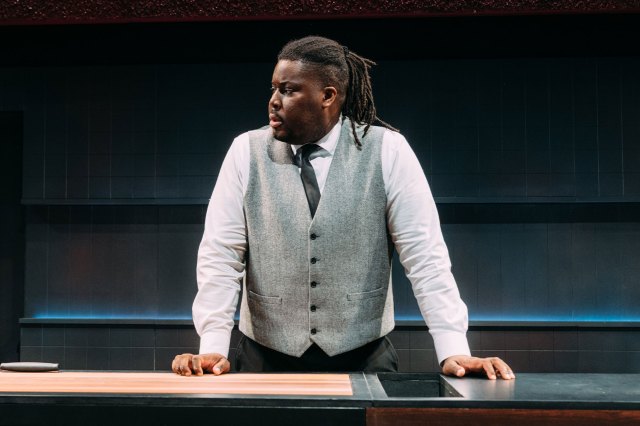Dealer’s Choice at Donmar Warehouse – review
Matthew Dunster’s 30th-anniversary revival runs until 7 June

What a blisteringly good play Dealer’s Choice is! A sharply funny, acutely insightful study of male insecurities, of the toxic relationships between fathers and sons, friends and colleagues, of the impulse to gamble a life on the turn of a card.
It was Patrick Marber’s first play, written in 1995. Yet the only idea that dates it is that waiter Mugsy’s plan to convert a former public convenience in the Mile End Road into a restaurant is treated by everyone as a loser’s joke. Now it looks like a far-sighted bit of business acumen.
The action turns around a Sunday night poker game between workers and boss in Stephen’s mid-market London restaurant. The battle lines between them are drawn in the opening act. Stephen (Daniel Lapaine) believes he can control the odds, gambling responsibly, using the game as a means of connecting with his wastrel, compulsive son Carl (fragile and troubled Kasper Hilton-Hille). Chef Sweeney (Theo Barklem-Biggs) knows he is an addict, and doesn’t want to take part, because he wants to save some money to spend on his small daughter, whom he’s seeing the next day.
Waiters Frankie and Mugsy have different dreams. Sleazy Frankie (Alfie Allen in rakish form) has his eyes fixed on professional gambling in Vegas while Mugsy (Hammed Animashaun) is a bouncy optimist, powered by his belief that when he loses, it’s bad luck, and when he wins (which is rarely), it is skill. The long-established dynamics, the cut and thrust of teasing and knowledge between them, are disrupted by the arrival of Brendan Coyle’s Ash, a professional gambler who has taken Carl under his wing – and has arrived to collect a debt.

You can see the influence of Pinter in Marber’s deadpan dialogue. “Was there much history of death in the family?” Mugsy asks at one point. But he paints these characters with a savage compassion that is entirely his own. You don’t have to understand anything about poker to know that every one of these men thinks they are a winner, in control of the odds, and that they are all, in different ways, losers and mugs.
Matthew Dunster’s production loads this carefully sculpted structure with perhaps more external weight than it needs. Moi Tran’s set makes the restaurant a very specific place of sticky floors and shiny walls, with half devoted to the kitchen and half to the dining area; in the second act, the stage rises to become a ceiling, revealing a sunken basement beneath from which the actors have to exit via a steep iron staircase, their effort a physical sign of how hard it is to leave.
There’s also a revolve as the game progresses, which dissipates rather than builds tension; it leaves the final tense confrontation between Carl’s two fathers, the real and the surrogate, played with Ash’s back to the audience.
But the revival is beautifully cast and the direction taut. Coyle is devastatingly still as Ash, menacing, amused and strangely sorrowful. The look on his face when someone suggests playing for “fun” is a picture of frozen horror, but also regret. Lapaine is equally subtle as Stephen, a man bound up in restrictive codes which prevent him from showing his clear love for his hopeless son. The understated tragedy of Sweeney, a man who cannot stop himself from gambling, however hard he tries, is beautifully caught by Barklem-Biggs’ slow disintegration and humiliation.

But it’s Animashaun’s Mugsy who dominates the play, his endless, larger-than-life hopefulness turning a born loser into a beacon of energy. His constant attempts to be business-like, to aspire to something better are beautifully undercut by his sense that he might be on the butt of people’s contempt.
As Stephen turns down his chance to invest in the restaurant plan, Animashaun endlessly rearranges the condiments on the counter in front of him, a tiny gesture of trying to make order of a life where if everybody plays the man not the cards, he will always be the mug.















